

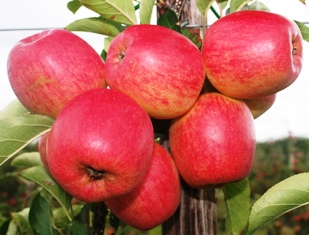 After the early season apples, the second earlies, Zari and Estivale are now in the shops
After the early season apples, the second earlies, Zari and Estivale are now in the shops
Discovery is coming to an end and Galmac and Zari dessert apples are in the shops along with Estivale in Waitrose and M & S. This coming week will see Worcester Pearmain arrive in Supermarkets with Early Windsor later next week. Most of the multiples will have a mix of English Red Dessert varieties available.
Below: A pack of Zari bought in Sainsburys today by The English Apple Man

Bambinella - the baby pear originating from Malta and now grown in Kent, should be in selected M & S stores next week.
Recently The English Apple Man joined a small group of Zari growers and FAST advisors for an update on Zari tree management. Our first stop; Park Farm at Frittenden in West Kent where farm manager Jonathan Duke has been growing Zari since 2009. Chris Levett and John Clark from FAST have been assisting growers in 'critical' tree management techniques.
Looking back......
When the first Zari was planted by Clive Goatham, anticipation of an apple capable of replacing Discovery engendered some considerable excitement. Zari is licensed to A. C. Goatham & Son who recognised the potential of this variety on a visit to Belgium several years ago. Zari is a cross between Elstar and Delbard Estivale.
Below: Mr Zari - Clive Goatham
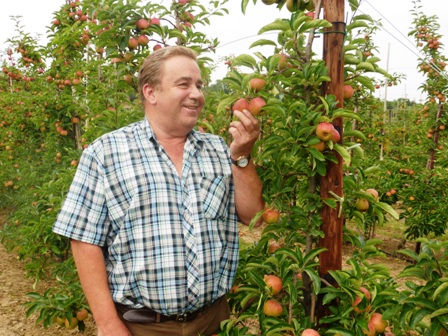 Clive had staked a lot on the success of Zari since the first planting at his Stallance Farm in Sutton Valence in Kent in 2008 and he encouraged 6 other growers to join his 'Zari bandwagon' resulting in 30 hectares planted between 2008 and 2011. Plans for a further 5 hectares per year over the next 5 years will result in 55+ hectares by 2016.
Clive had staked a lot on the success of Zari since the first planting at his Stallance Farm in Sutton Valence in Kent in 2008 and he encouraged 6 other growers to join his 'Zari bandwagon' resulting in 30 hectares planted between 2008 and 2011. Plans for a further 5 hectares per year over the next 5 years will result in 55+ hectares by 2016.
Early yields appeared to support that promise. In 2011 some spectacular crops of Zari endorsed the plans for expanding Zari acreage.
In 2012 questions arose about the ability of Zari to crop regularly - 'year on year' as yields fell well below expectations. Since then a lot of work has been carried out by FAST advisors Chris Levett and John Clark in understanding the characteristics of Zari and how to ensure regular cropping.
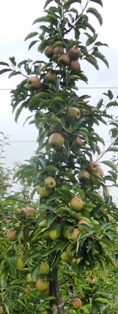 Developing a well balanced tree is integral to the success of any variety, ensuring light for fruit bud quality and fruit development is important, as is, getting the 'crucial balance' between vigour and cropping. Understanding the characteristics of Zari took a little time.
Developing a well balanced tree is integral to the success of any variety, ensuring light for fruit bud quality and fruit development is important, as is, getting the 'crucial balance' between vigour and cropping. Understanding the characteristics of Zari took a little time.
At Park Farm Chris Levett and John Clark told us the first step was to study the efficacy of pollination; Park farm is far from any other apple orchards, the pollinators were Malus, and it was clear the trees near to the pollinator carried more fruit than those further away - in 2012 there was a poor set on all trees. Planting Golden Delicious (a very good pollinator) which flowers at the same time as Zari was the first step forward. The same strategy has been used at other farms growing Zari.
Chris and John identified the key factors required for balanced cropping; removing any strong branches, particularly on the upper section of the tree while encouraging weaker fruiting wood keeps the tree in balance. Chris said once the tree size is established, we do not need more wood; other than as replacement. The perfect tree has enough structure to carry the optimum crop without growing excessive 'timber' - the tree needs just enough vigour to grow new/replacement fruiting wood and feed the crop.
Below: Jonathan Duke and John Clark - and - illustrating optimum fruiting units
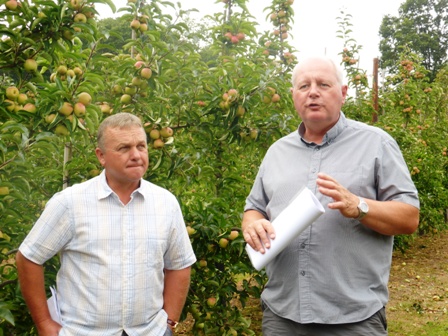
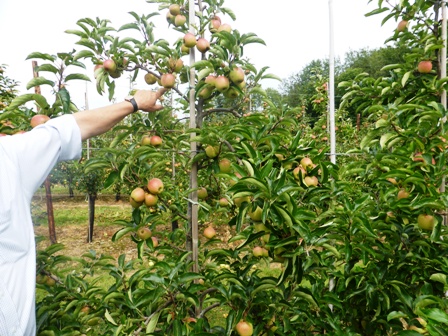
Below: FAST advisor Chris Levett has been heavily involved in developing orchard 'tree management strategy' for Zari.
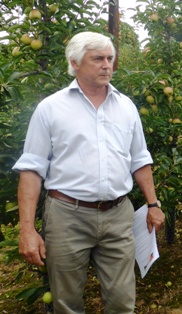 Much has been said about biennial cropping; Chris Levett said varieties 'labelled' as biennial croppers, rather than truly biennial, have been mismanaged. Understanding a variety and managing its characteristics is critical to delivering balanced cropping.
Much has been said about biennial cropping; Chris Levett said varieties 'labelled' as biennial croppers, rather than truly biennial, have been mismanaged. Understanding a variety and managing its characteristics is critical to delivering balanced cropping.
Zari can display biennial tendencies if it is not managed carefully; but this is true of many other varieties, in fact most varieties will crop irregularly if the tree is mismanaged. Braeburn of the 'newer' global varieties will carry a much lighter crop following a heavy crop, if the 'on year' is not thinned and/or supplied with the supportive nutrition. Chris said; the one variety which seems to crop 'year in year out' is Gala - but even Gala will be influenced by 'over-cropping' albeit less dramatically.
Chris and John highlighted the 'critical factor' - "we are really 'farming blossom' - by supporting the tree at flowering time by reducing competition from the vegetative influences of the tree, the tree will set more fruit and the battle for a regular crop is made easier. The key to a successful fruit set is the strength of the flower quality. Several factors increase the strength of the flower - one of the obvious one's - thinning the crop to the optimum fruit numbers; 'in the case of Zari, trying to get yields much above 40 tonnes per hectare is not feasible without influencing the yield for the next year. The strength of the return flowers for the following year will also be influenced by removing the current season's crop as early as possible.
Below: Overcoming Rabbit damage with a 'double defence' of 2 tree guards
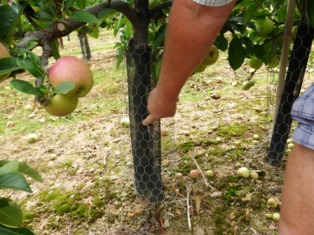 While walking the orchards at Park farm we noticed the 'double defence' around the trees; "Rabbits" exclaimed Jonathan are so persistent they lift the wire protecting the trees and damage the trunk - the 'practical option' - double defence - using a plastic tree guard (normally used as a temporary guard on young trees) + the permanent wire guard, this DD system has overcome the voracious appetites of the rabbits who enjoy the cover of the large areas of woodland surrounding Park Farm.
While walking the orchards at Park farm we noticed the 'double defence' around the trees; "Rabbits" exclaimed Jonathan are so persistent they lift the wire protecting the trees and damage the trunk - the 'practical option' - double defence - using a plastic tree guard (normally used as a temporary guard on young trees) + the permanent wire guard, this DD system has overcome the voracious appetites of the rabbits who enjoy the cover of the large areas of woodland surrounding Park Farm.
Controlling growth
Work carried out by orchard specialists in Germany have shown that the use of Regalis at early flower and also at petal fall, will subdue the vegetative hormones at the critical stage when the tree is trying to gather the energy for a crop set - "Regalis is a growth regulator for the control of shoot growth in apples"
From Park Farm the group drove a few miles to Griffin Farm at Sutton Valance, a farm bought by Clive Goatham in 2008 and the site of the first Zari orchards in England.
Below: These Zari trees demonstrate the ideal 'slender' tree shape
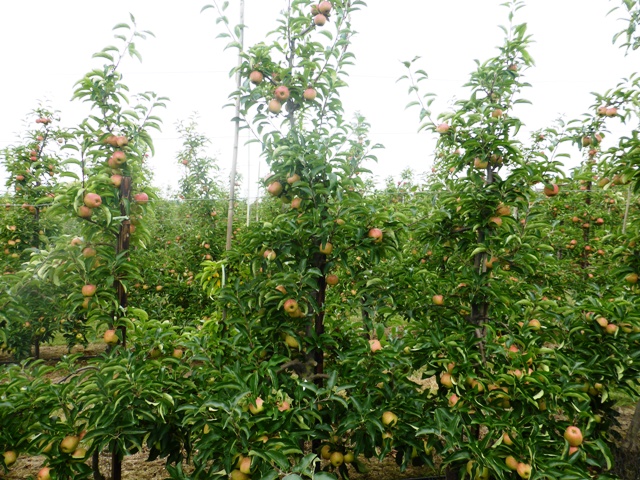
Below: Chris Levett indicates a key element - and - a 3 year old Zari orchard at Griffin Farm
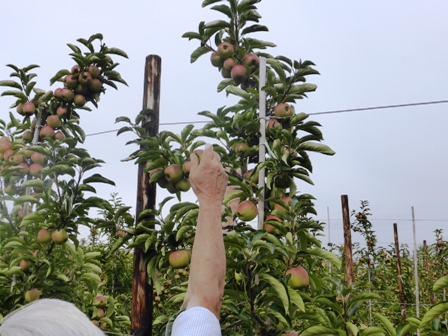
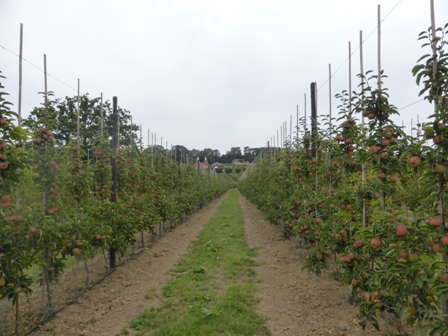
Below: 3 year old Zari trees at Griffin Farm
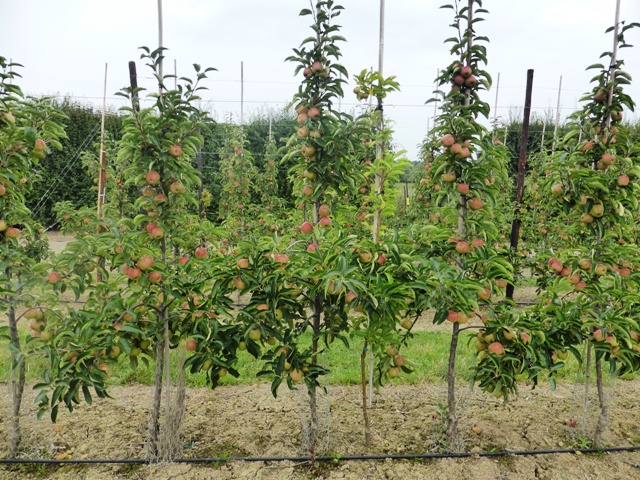
The success of Zari owes much to the vision of Clive Goatham, who recognised the potential of this excellent variety and the technical support of FAST, however 'on the ground' the management skills of those working with the trees on a daily basis is a critical element. Jonathan Duke at Park Farm and Piotr Bukowski at Goathams are making the difference between acceptable and outstanding results.
Below: Goathams - Farm Production Manager - Piotr Bukowski.
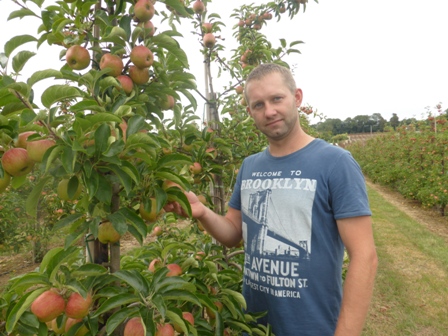
Below: The Zari group pose at Griffins Farm
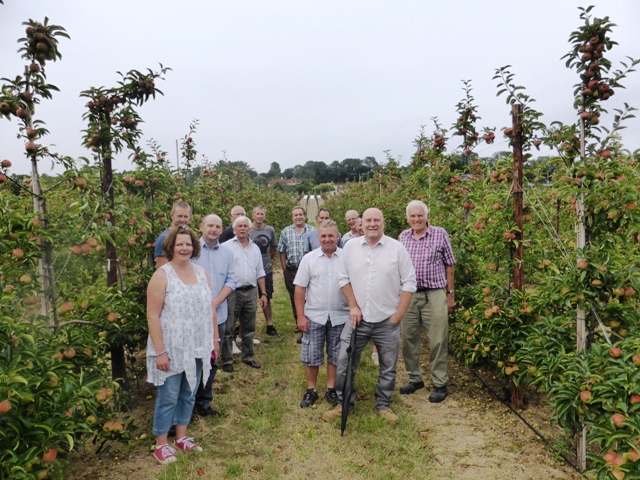
Below: a stunning view through the oldest Zari at Griffins Farm towards the slopes of the North Downs
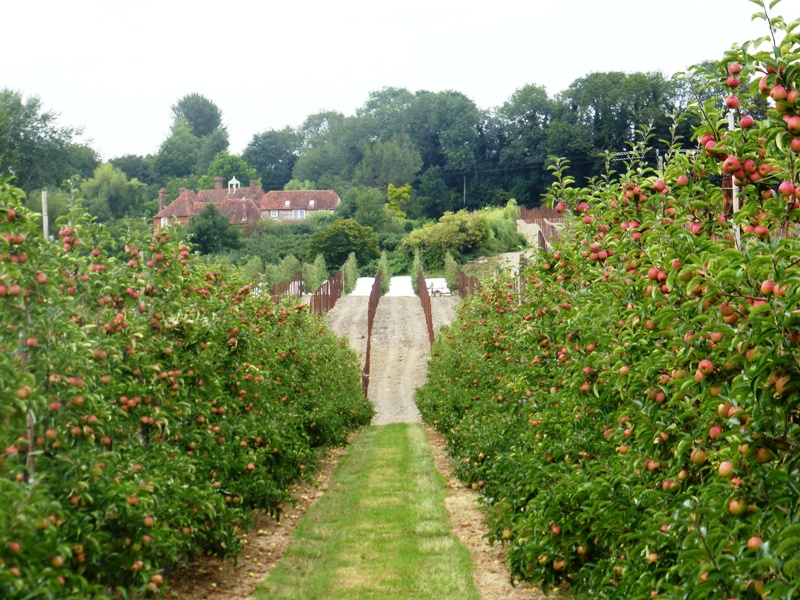
Returning to the build up of 'new season' English Apples; as mentioned Zari, Galmac, and Estivale are available now, with Worcester Pearmain and Early Windsor 'waiting in the wings' - next week The Gala Club will hold the annual pre-harvest event; this is the perfect opportunity to assess the coming season's prospects with Technical and Marketing personnel present. Adrian Barlow - CEO of English Apples & Pears will update growers on the global and UK market prospects.
Gala Club details
FAST's Tim Biddlecombe will review the fruit quality/dry matter link, WWF/Qualytech's Martin Luton will over-view fruit maturity, ICA's David Bishop will talk about their Safepod Technology, and EAP Ltd's Adrian Barlow will all contribute to 'seasonal presentations'.
Next week The English Apple Man will report on The Gala Club meeting.........until then......
Take care
The English Apple Man
PS: We all get 'funnies ' sent by friends on our email; this one made me chuckle - Why didn't Noah swat those two mosquitoes?